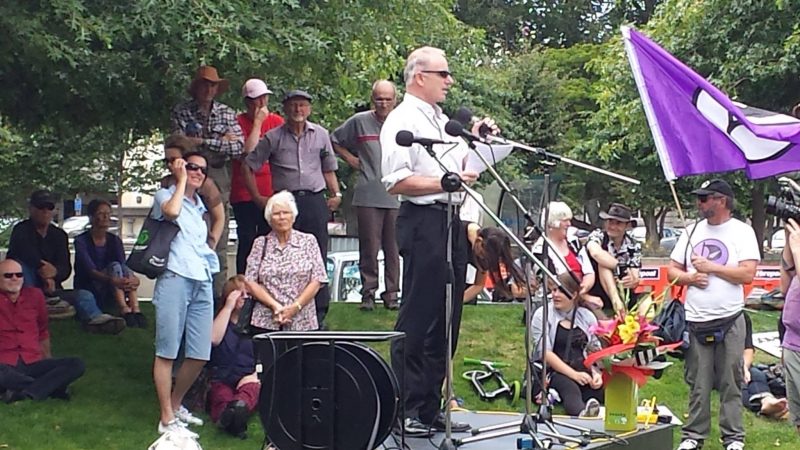by NZ CATHOLIC staff
Palmerston North Bishop Charles Drennan denounced the secret negotiations of the Trans Pacific Partnership Agreement as he marched with hundreds of protesters on March 7.

Bisop Charles Drennan speaks before the protesters against the Trans Pacific Partnership Agreement at The Square in Palmerston North.
The partnership (TPPA) is a proposed regional free trade deal between 12 countries in the Asia-Pacific region: New Zealand, Australia, Brunei, Chile, Japan, Malaysia, Peru, Singapore, United States, Vietnam, Mexico and Canada.
Some of those against the TPPA say it is a concern because of the secrecy surrounding it and the fear that it may give international corporations more legal rights than governments.
“Absolute freedom to market anything anyhow is not in our interests,” Bishop Drennan told a crowd of 500 in The Square, Palmerston North. “It most certainly is not a right of global business interests to trump the duty of an elected government to govern a nation’s
economy broadly in accord with the wishes of that nation’s citizens.”
He said policies driven by ideology rather than principle are placing more and more pressure on the poor.
Bishop Drennan was joined on the Palmerston North march by members of the Palmerston North Diocesan Commission for Justice, Peace and Development, the Catholic Worker Movement,
and representatives of different parishes of Palmerston North diocese.
In Auckland, the Peace and International Justice Committee of the diocese’s Justice and Peace Commission released a statement opposing TPPA.(see statement below)
“If we remain indifferent,” the statement said, “we might discover that giant multinational corporations could drag our government off to court because it had passed a law that threatened their profits.”
The committee explained that under the provisions of “what are called Investor- State Dispute Resolutions, investor parties could sue governments of countries for failing to abide by the terms of the agreement”.
And because the negotiations are secret, New Zealanders do not know how far the negotiators will go to conclude the agreement.
“It’s an assault on our rights as citizens and an attack on the centuries-old concept of the social contract that has underpinned all democratic societies for more than 200 years,” the statement said.
“It’s an assault on the Catholic Church’s teachings on social justice, which say that people must be free to live in a fair and equitable society in which their voices are heard.”
Bishop Drennan told Palmerston North protesters that protests were often “a series of ‘No’s’”, so he was offering some “Yeses”.
“Yes to fairness and justice. Yes to a vision of our world that upholds a united global family that respects rather than squashes regional goals and aspirations. Yes to the gift of creation … to the duty of using the resources of this land with respect to our creator God and with love of our future generations, our mokopuna.”
Statement on the Trans Pacific Partnership Agreement
Prepared by the Peace and International Justice Committee of the Auckland Diocese Justice and Peace Commission.
March 11, 2015
Pope Francis has exhorted us to wake up.
In his Lenten message he laments that indifference is killing our earth, killing our children, killing our civilisation and tearing apart our humanity.
Being indifferent is like being asleep, only worse. It’s like knowing we should get up and do something, but instead we pull the blankets up over our heads and ignore what’s going on.
It means that we won’t get out of bed and play our part in finding a solution to the things that threaten us.
In his Lenten message, Pope Francis says that God is not indifferent to our world. If God is not indifferent, then how can we be?
If we remain indifferent, if we keep the blankets pulled up over our head, we might discover that while we have been hiding, our voice, our heritage and our freedom have been silently stolen from us.
We might discover that giant multinational corporations could drag our government off to court because it had passed a law that threatened their profits.
Right now our government is involved in the Trans Pacific Partnership Agreement (TPPA) talks.
The talks are aimed at creating a far reaching trade agreement that will put corporate profits before people’s livelihoods.
The talks, which have been conducted behind closed doors in several countries across the Pacific, contain proposals that would allow any corporation that thought its profits or business were affected by the laws of a signatory nation, could take the government to court.
Under the provisions of what are called Investor State Dispute Resolutions, investor parties could sue governments of countries for failing to abide by the terms of the agreement.
Because these talks have been kept secret we don’t know how far those involved are prepared to sacrifice our right to live in a society where we, the people, have the final word, not some corporate lawyer.
That’s right. Our government, the government we elect, could be overridden by a company we didn’t elect and over which we have no power.
What if a corporation decided that the right to a basic wage threatened its profits? Or if a company decided that it wanted to destroy our right to access subsidised generic medicine?
What if a company decided the way the Treaty of Waitangi was being implemented threatened its potential profits? What if a company didn’t like provisions concerning the seabed or to Treaty-based objections to the sale of rights to water or other resources?
The possibility of this happening is all too real. It’s an assault on our rights as citizens and an attack on the centuries-old concept of the social contract that has underpinned all democratic societies for more than 200 years.
It’s an assault on the notion that governments must reflect the will of the people, not businesses or special interest groups or those who are not elected.
It’s an assault on the Catholic Church’s teachings on social justice which say that people must be free to live in a fair and equitable society in which their voices are heard.
These common values are based on the idea that we all have rights and responsibilities, that there is a bond between the people and its government and that everybody must work together to make sure we live in a just world.
Concepts of the common good, of rights and responsibilities are fundamental to Catholic Social Teaching.
Behind these teachings are ideas of solidarity, participation and subsidiarity. Catholic principles of justice say that society exists for the benefit of the person.
Individuals, peoples and nations have certain rights– religious, political, economic and legal – which are realised in community and must be respected and protected.
Along with rights, people have duties and responsibilities.
The common good is the sum total of all those conditions– economic, political, and cultural – which make it possible for women and men to achieve their human potential. The government is the instrument by which people co-operate in order to achieve the common good.
This is only possible when citizens at all levels can be involved. This is what Catholic Social Teaching calls subsidiarity, the idea that the state must support and respect the initiative, freedom and responsibility of individuals and groups at the lower levels of society.
Democratic participation in decision making is the best way to respect the dignity and liberty of people and to ensure that nations function equitably.
But how can we truly say we are taking part in a democratic system if the voice that counts is not ours, but that of a corporation, the stock markets or an investors’ meeting?
How can people achieve their human potential if the secretive TPPA negotiations lead to situations where our government cannot put forward legislation that might be what we want, because it threaten the profits of a company?
As New Zealand residents we must be deeply concerned at anything which threatens the sovereignty of our nation and all our peoples.
Indifference is not an option
It’s time we stopped being indifferent.
As New Zealand residents we would be truly indifferent if we tolerated a situation where the secret Trans Pacific Partnership Agreement threatened the freedoms and liberties enshrined in this country’s laws, including the Treaty of Waitangi.
We would be truly indifferent if we ignored the principles of Catholic Social Teaching.
We would also be truly indifferent if we didn’t tell our government not to agree to any provisions in the proposed trade treaty which threaten the voice of the people.
We would be truly indifferent if we didn’t tell our government not to give up the tariffs that protect what is left of our local industries.
We would be truly indifferent if we didn’t tell our government not to agree to any provisions which undermined New Zealand’s struggle to provide meaningful employment to its people, to defend workers’ rights and improve standards of living.
What can I do?
In this year’s Lenten message, Pope Francis reminds us of the words of 1 Corinthians: “If one member suffers, all suffer together” (1 Cor 12:26). The implications of the Trans Pacific Partnership Agreement talks threaten everybody in New Zealand so our response must be one that responds to the needs of all our fellow citizens.
As Pope Francis says, when our existence seems threatened in such a comprehensive way, it is tempting to feel completely unable to help.
But we can help. You can help. We must help each other.
For a start, keep yourself informed about the Trans Pacific Partnership Agreement talks and their implications.
You should also keep yourself informed on Catholic Social Teaching and think about how it relates to these issues.
You can take action, either by yourself or with others, through your school or parish by making sure you know what is going on, by expressing your concern by writing to the government and your local member and by making sure they know that you expect them to respect the principles of social justice.
Look at what different organisations, NGOs and political parties are doing and decide which ones you want to support in light of their stance on social justice issues.
Make sure they know what your support depends on when they ask for a donation or your vote.
Finally, you might like to reflect on these words from St John XXIII from his 1963 encyclical Pacem in Terris:
“Human society…demands that people (sic) be guided by justice, respect the rights of others and do their duty. It demands, too, that they be animated by such love as will make them feel the needs of others as their own, and induce them to share their goods with others, and to strive in the world to make all people (sic) alike heirs to the noblest of intellectual and spiritual values. Nor is this enough; for human society thrives on freedom, namely, on the use of means which are consistent with the dignity of its individual members, who, being endowed with reason, assume responsibility for their own action.” (Par 35)

Reader Interactions